#or even the predicted data
Text
How Seeq enables the Practice of MLOps for Continuous Integration and Development of the Machine Learning Models
Using ML/AI now they have enabled themselves to not only understand the importance of parameters but also to make predictions in real-time and forecast the future values. This helps the industry to manage and continuously improve the process by mitigating operational challenges such as reducing downtime, increasing productivity, improving yields and much more. But, in order to achieve such continuous support for the operations in real-time, the underlying models and techniques also need to be continuously monitored and managed. This brings in the requirement of MLOps, a borrowed terminology from DEVOps that can be used to manage your model in a receptive fashion using its CI/CD capabilities. Essentially MLOps enables you to not only develop your model but also gives you the flexibility to deploy and manage them in the production environment.
#Due to the rapid advancement in technology#the Manufacturing Industry has accepted a wide range of digital solutions that can directly benefit the organization in various ways. One o#increasing productivity#improving yields and much more. But#in order to achieve such continuous support for the operations in real-time#the underlying models and techniques also need to be continuously monitored and managed. This brings in the requirement of MLOps#a borrowed terminology from DEVOps that can be used to manage your model in a receptive fashion using its CI/CD capabilities. Essentially M#Let’s try to add more relevance to it and understand how Seeq can help you to achieve that.#Note: Seeq is a self-service analytics tool that does more than modeling. This article is assuming that the reader is familiar with the bas#Need for Seeq?#Whenever it comes to process data analytics/modeling#visuals become very much important. After all#you believe in what you see#right?#To deliver quick actionable insights#the data needs to get visualized in the processed form which can directly benefit the operations team. The processed form could be the clea#derived data#or even the predicted data#but for making it actionable it needs to be visualized. The solutions should peacefully support and integrate with the culture of Industry.#MLOps in Seeq#For process data analytics models could accept various forms such as first principle#statistical or ML/AI models. For the first two categories#the management and deployment become simple as it is essentially the correlations in the form of equations. Also#it comes with complete transparency#unlike ML/AI models. ML/AI on the other hand is a black-box model#adds a degree of ambiguity and spontaneity to the outcomes#which requires time management and tuning of the model parameters. This could be either due to the data drift or the addition/removal of pa#1.Model Development:#One can make use of Seeq’s DataLab (SDL) module to build and develop the models. SDL is a jupyter-notebook like interface for scripting in#one can use spy.push method to extract the maximum information out of the model using Seeq Workbench and advanced Visualization capabilitie
0 notes
Text
I support the nuanced and varied debates against ai art from now til kingdom come, but by far my favorite one to use is extremely basic and simple and I will always always refer back to it so here you go:
Art is the expression of the human experience and you can't generate that.
#ragamusings#anti ai#anti ai art#i am versed in the other arguments about the whole system being built on stolen data#so there literally is no ethical way to use it to begin with#and etc etc etc#but art by definition is the expression of the human experience#any whenever you let an algorithm predictive model computing something take over that process#it is no longer art#even if it is nice to behold it is not art
47 notes
·
View notes
Text
here’s my little guide to predicting the weather without having to use proper gear or look on the news/app/online/etc!
I’ve always wanted to have easy little ways to tell the weather, so I spent the past few hours doing some research and came up with a fun little guide to predict the weather. Most of this doesn’t bring a guarantee, but it’s fun to try if you’re able to get out for a bit. Have fun!
Crickets- count how many times a cricket chirps in 14 seconds, add 40, and that’s the temperature in Fahrenheit. do this multiple times to get an average
Red sky- in the morning means bad weather is on the way. in the evening means it’s passed.
Ring around the moon- yes: rain/heat. no: frost/cold.
Pine cones- open: good weather. closed: bad weather.
Dandelions- they close their petals at night. if their petals don’t open back up in the morning, it’ll probably rain.
Smells- things smell stronger when there’s high humidity. Compost smells are also important, it means a plant is emitting waste. Storm is coming.
Cloud height- low clouds mean weather is closer. High clouds mean it’s farther away.
Clouds- big towering fluffy looking clouds can collect up and bring storms.
Ants- if ant mounds are suddenly higher, it means a storm could be coming.
Birds- birds flying low or birds getting quiet can indicate storms.
Birds 2- if birds eat during a storm that means it’ll be a long one. If they wait until it’s done that means it was a quick storm.
Bugs- bees and butterflies head home before a storm. If there’s less of them, a storm could be coming.
Cows- if cows are huddled together and lying down that means a rainstorm could be coming.
Hair- frizzy hair can indicate high humidity and then tain.
Times of day- afternoons are usually when the weather gets the most crazy.
Days- Whatever happened the day before is likely to happen again today, but not guaranteed. Look for similar patterns, sudden changes, or lack of changes to predict.
Wind- if the wind suddenly is moving in a different direction than usual, or the clouds are, then change is here and the weather might be wonky. Observe the average wind direction of your area and take account of when it shifts or changes. You can drop sand/dirt or leaves to see what direction the wind is blowing. Or you can just see where your hair/scarf is pointing.
Leaves- oak and maple leaves curl with high humidity, so watch for that.
Dew- dew on grass in the morning means the weather will be good, but if there’s no dew, bad weather can be expected
#randompajama writes#weather#ways to predict weather#easy weather#yay weather#it’s been rainy the last few days#I’m gonna try and predict if it’ll rain tomorrow again#I’m gonna guess yes with the data I’ve already got#But I might be wrong#im gonna be watching out this evening for the red sky to see if it’s passed or not#yippie#This is so fun#i love the weather#And I love being cryptic about predicting the weather
6 notes
·
View notes
Text
#'m sleepy rn#but i see the mcytblr sexyman chaos and i want in /hj#it'd probably be a nomination -> seeded bracket type poll#with all 17 members + predictions for new members maybe?? so we get an even number#i dunno i just want the data#not a bad idea#admin#trafficblr#mcytblr#mcyt
25 notes
·
View notes
Text
A/I STAN IN THE DASH. I REPEAT A/I STAN GOT THROUGH MY FILTERS INTO THE FUCKIN DASH THIS IS NOT A DRILL
#unfollowed immediately but good FUCKIN grief will i ever be free#i don't care if you find it pretty i don't care if it saves you time it is literally built upon#abusing the work of others and fucking over their mental health or livelihoods#for the sake of commodifying what was meant as GENUINE COMMUNICATION with our fellow human beings#i'm not even talking abt like. what it might do to artists or writers#i'm talking abt the people (usually in the global south) who get fucked over by (usually usamerican or western) companies#who don't care about what it does to their mental health to process a fuckton of data that contains graphic fucking atrocities#and pay them pennies by the hour when they DO remember to pay them#it's scummy practices at EVERY level and i'm sorry if you think you're an ~anarchist~#but unless YOU are the one sifting through the bulk of the internet to make a functional prediction machine#(which isn't even SAPIENT the name is just fucking false advertisement)#you can fuck off with your 'nyah nyah you're a crybaby who can't accept progress ppl hated photography too' bullshit#(also like. i Do care abt artists and writers and translators. obviously. but that stupid argument abt how all intellectual property is#the work of satan and that's why ai is Okay Actually drives me up the fucking WALL#tell that to the brother of that artist who has soulless fucking ARSEHOLES making money#off his dead sister's art through ai)#ok. ok ok i'm shutting up now i have no chill when it comes to this subject#ai wank#theftware tag#joji.txt
2 notes
·
View notes
Text
I went to that interview for the study about computer literacy relative to level of formal education and it was basically fine if a bit longer than I thought it would be. The interview section was all multiple choice questions (I guess in an international study of this size, quantitative data is easier to analyse) and then I took an assessment on a tablet.
In one section of the interview, I was asked a lot of questions about if and how often I did certain things for work (reading in general or reading manuals/articles/journals specifically, writing in general and more specific kinds of writing, creating or analysing graphs or charts) and then I had to answer the same questions about if and how often I did these things outside of work. The interviewer got to "How often do you create or analyse graphs or charts outside of work?" and was like "I guess probably 'never' right?" and I was like, "Uh... maybe at least once a month is closer..."
#so like as predicted I do not know how representative of a data point I am lol#but I feel like you have to give accurate answers instead of trying to guess what the mean is and deviate to that#because otherwise what's the point of them even doing research in the first place?#but anyway yeah#giving much needed representation of the college dropout who makes spreadsheets for fun demographic
8 notes
·
View notes
Text
the next n25 event (which i predict will occur sometime around march 11-ish) will probably be a kanade banner and might finally release n25!kaito
#THIS IS JUST A PREDICTION BTW!!!#i am not trying to subtley leak this im just saying based on my data!!!#the last voca to join the empty sekai was len back in june 22 and before him was luka in june 21#so kaito might come june 23 but also we could get him in line with my prediction#also leaks arent even out for march yet lmao#25ji nightcord de#nightcord at 25:00#puroseka#project sekai colorful stage#project sekai#toby.txt#mizuki akiyama#akiyama mizuki#ena shinonome#shinonome ena#mafuyu asahina#asahina mafuyu#kanade yoisaki#yoisaki kanade#polls
9 notes
·
View notes
Text
tech workers need to unionize
#im ok and im not thinking about the soul crushing fact#that the us military and dod are so deeply intertwined with the past and present of computing technologies#modern internet? darpa. military project#spacex? military project#all social media companies? have already sold your data to law enforcement#ai predictive policing palantir amazon microsoft ICE etc etc etc#these arent just superficial ties they r the foundation of the industry#(just as imperialism is a foundation of the country)#and these connections arent going to break except under immense pressure#from outside AND inside the workplace#OH YEAH AND NOT EVEN VIDEO GAMES ARE INNOCENT#UR FAVORITE MAJOR 3D ENGINE HAS MILITARY CONTRACTS FOR DEVELOPING TRAINING SIMULATIONX#truly therr r just#tooooooooo many goddamn examples
2 notes
·
View notes
Text
oh come to think of it. cale's ability works by taking in data. it's no wonder he's in the habit of not showing his hand, even to his allies.
#wwaffles bein' an idiot#wwaffles reads lch#he was able to use data to predict when and where a monster was going to appear#and even at the ''end'' of that battle he was able to give the reinforcements the thing's moveset#and advice on how to take it down#that's something that he can easily do just after watching something for long enough#even if its a superhuman ability that no one else has it would probably shape his personality#(this is also a skill that raon has which i think is interesting👀)
1 note
·
View note
Text
I'm very tired, I have to do everything around the house myself (as in, I keep having to turn the water off and on to the kitchen sink until I teach myself to install a new faucet, and negative cleaning gets done if I don't do it), and the money is in the hands of the third worst person in the whole family when it comes to money (the worst being my grandpa who is dead, and my grandma who blows all her money on overpriced jackets and other junk)
I'm very tired, I have to teach myself how to do everything, and I have almost literally no support in any way shape or form ever
I can't remember the last time anyone said they were proud of me... I don't actually know if anyone's ever used that word with me before. When I do something like get the trailer cleaned out or buy a house, frankly no one gives a fuck, except my grandma who gets mad
I haven't actually had a chance to see anyone that counts as a friend in like 15 years, and I mean even in high school everyone liked me but no one could be bothered to actually ever even talk outside school... so even back then it's not like I had anyone I was close with
I'm providing this version where I totally remove how I feel or how I view myself from the description and instead try to provide something close to an objective description of things
So if you wonder why I say what I say about myself, honestly I think it's pretty much all summed up here
#mm tag so i can find things later#also this is why you can maybe piss off instead of coming around here and saying I should get off the internet and go to therapy#in spite of how morose I am; I'm actively working to fix this stuff by... at least learning more of the skills I need#like... learn to replace a faucet; then at least I don't have the sink issue weighing me down#and maybe if I fix enough of it someday things'll be ok#although... in my mind no matter what I do I'll still be alone and unlovable; but that's just a description of how I view things#regardless of how I may feel; I am trying to do stuff to fix how I feel by trying to fix my situation#so like... if you're gonna come here and tell me I need to fix my mental health#may I respectfully say either you can lend me a hand or maybe you should mind your own business#cause what the fuck do you think I'm trying to do?#not that anyone will read this or particularly care#not trying to be rude or something; just extrapolating past data to make a prediction#it's not that people here don't care or don't like me; it's just we're all busy with our own lives and no one really knows what to do#well I'm... I'm trying to write you a guide; I'm asking for help here#...to an extent it's totally fine if no one helps... but you kinda don't get to go around acting like you love being asked for help#I mean... you do; it's your life... but I'm just saying... this is me asking for help... yet again#but I expect nothing because that's what usually happens#I really don't mean to... to imply anything about anyone else; it's just descriptively I don't get help and I don't get support#and... based on all the information I have my model for the outcome of this says no one will even notice it#that tag of mine of things I can find later or whatever... it has me outright saying a number of things#...no one ever hears or listens#anyway; there it is... another pointless cry for help#...don't say I didn't warn you when I wind up killing myself one day#probably not anytime soon; maybe not ever... all I'm saying is don't pretend you didn't see it coming or like I didn't reach out#at least... as best I could... maybe I could have done better#like sure; could I walk up to specific people and say 'I need you to do this'; sure...#but I find... I find people just ignore it if I say that too#so I've given up; you know?#this is the best I can muster#don't say I didn't tell you
0 notes
Text
So I knew the right answer and I pressed the wrong bcs I thought "ugh I already know this is the right answer bcs Im more experienced at this point BUT WHAT IF he wants to teach them by 101 from the very beginning what x means?! " AND I FAILED BY CHOOSING THE WRONG ONE EVEN THOUGH I KNEW IT WAS THE WRONG ONE!
#anyways every failure is a data!#this failure's data says: TRUST YOUR GUT AND DON'T LET THIRD STUPID THOUGHTS HUNT YOU BCS U KNEW THAT THIS WAS FALSE N U CHOOSED IT#meanwhile its nothing to stress about#but im working to trust me even more and by that I just give to myself -10 points#and im pissed#lol#circe#witches predict but that was stupid with no reason#I'm not here to make something so small looking big but I found it as an opportunity to show you to trust yourself more <3
0 notes
Text
Friends, I think we need to talk about Covid.
I want to get a few caveats out there before I start:
I am aware that there are people who need to exercise extreme caution about Covid; I live with someone who has two solid organ transplants and who is at the most immune compromised level of immune compromised. *I* have to be extremely cautious about covid.
Masking does prevent a certain level of transmission, and people who think they may have covid should mask and people who are concerned that they may be at high risk for covid should mask.
You should be vaccinated and boosted with the most recent vaccines that are available to you; covid is highly transmissible and very serious, you do not want to get covid and if you do get covid you don't want it to be severe and if you do get covid you don't want to give someone else covid and up-to-date vaccinations are the best way to reduce transmission and help to prevent severe cases of Covid.
We should be testing before going to any gatherings, and informing people if we test positive after gatherings, and testing if we suspect we have been exposed.
It is bullshit that there aren't good protections for workers who have covid; you should not be expected to go to work when you are testing positive
It is bullshit that people who are testing positive are not isolating for other reasons; if you have Covid you should not be going out and exposing other people to it even if you are experiencing mild symptoms or no symptoms.
We do need better ventilation systems for many kinds of spaces. Schools need better ventilation, restaurants need better ventilation, doctor's offices and hospitals and office buildings need better ventilation and better ventilation can reduce covid transmission.
I want to make it clear that Covid is real and there are real steps that individuals and systems can take to prevent transmission, and that there are systems that are exerting pressures that needlessly expose people to covid (the fact that you can lose your job if you don't come in when you're testing positive, mainly; also the fact that covid rapid tests should be ubiquitous and cheap/free and are not).
All of that being said: I'm seeing some posts circulating about how we're at an extremely high level of transmission and the REAL pandemic is being hidden from us and, friends, I'm pretty sure that is just incorrect and we're spreading misinformation.
I'm thinking of this video in particular, in which the claim is made that "your mystery illness is covid" in spite of negative tests. The guy in the video says that there's nothing else that millions of people could be getting a day, and that he predicted this because a wastewater spike in December meant that there was a huge spike in cases.
I've also seen people saying that deaths are where they were in 2021-2022, and that we're still at "a 9/11 a week" of excess deaths and friends, I'm not seeing great evidence for any of these claims.
I know that we (in the US, which is where the numbers I'm going to be citing are from) feel abandoned by the CDC and the fact that tracking cut off in May of 2023. But that only cut off for the federal tracking.
I live in LA county and LA county sure as shit is still tracking Covid.
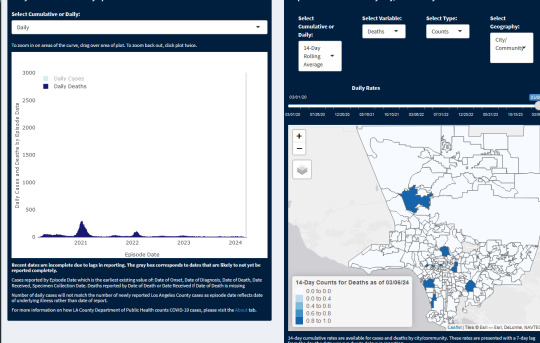
If you want a clearer picture, you can see the daily case count over time compared to the daily death count:
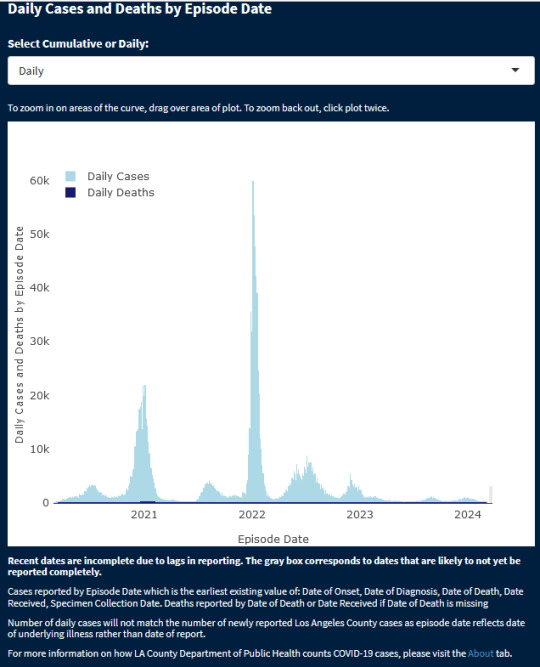
Okay, you might say, but that's just LA.
Alright, so here's Detroit:
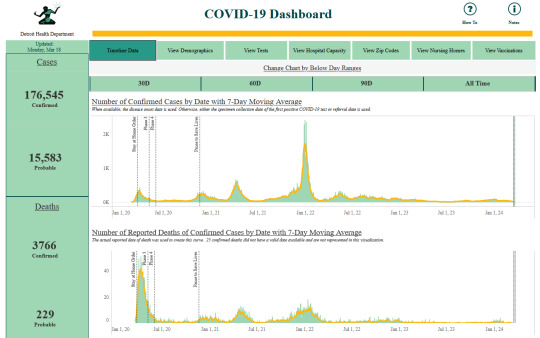
Right, but maybe that's CDC data and you don't trust the CDC at this point.
Okay, here's fatalities in New York tracked through New York's state data collection:
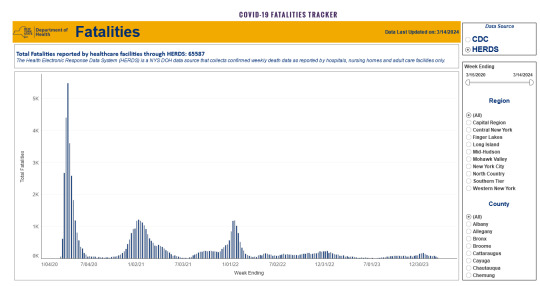
It's harder to toggle around the site for South Dakota, but you can compare their cases and hospitalizations and deaths for early 2022
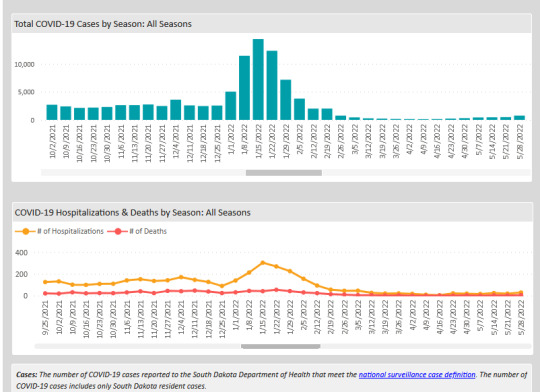
To cases and hospitalizations and deaths from early 2024
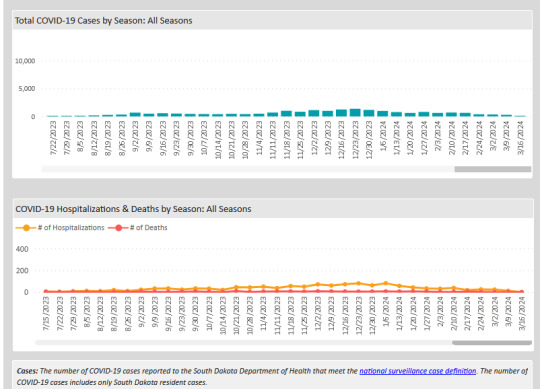
And see that there's really no comparison.
Okay, you might say, but people are testing less. If they're testing less of course we're not seeing spikes, and they're testing less because fewer tests are available.
Alright, people are definitely testing less than they were in 2021 and 2022. Hospitalization for Covid is probably the most clear metric because you know those people have covid for sure, the couldn't not test for it.
Here are hospitalizations over time for LA:

Here are hospitalizations over time for New York:
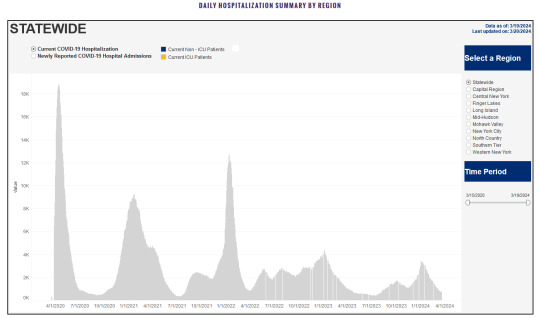
As vaccination rates have gone up, cases, deaths, and hospitalizations have gone down. It IS clear that there are case spikes in the winter, when it is cold and people are indoors in poorly ventilated spaces and people are more susceptible to respiratory infections as a result of cold air weakening the protection offered by our mucous membranes, and that is something that we will have to take precautions about for the forseeable future, just as we should have always been taking similar precautions during flu season.
So I want to go point-by-point through some of the arguments made in that video because I'm seeing a bunch of people talking about how "THEY" don't want you to know about the virus surge and buds that is just straight up conspiracism.
So okay, first off, most of what that video is based on is spikes in wastewater data, not spikes in cases. This is because people don't trust CDC data on cases, but I'd say to maybe check out your regional data on cases. I don't actually trust the CDC that much, but I know people who do tracking of hospitalizations in LA county, I trust them a lot more. Wastewater data does correlate with increases in cases, but this "second largest spike of the entire pandemic" thing is misleading; wastewater reporting is pretty highly variable and you can't just accept that a large spike in covid in wastewater means that we're in just as bad a place in the pandemic as we were in 2022. We simply have not seen the surge of hospitalizations and deaths that we would expect to see in the weeks following that spike in wastewater data if wastewater data was reflective of community transmission.
The next claim is that "there is nothing else that is infecting millions of people a day" and covid isn't doing that either. The highest daily case rates were in January of 2021 and they were in the 865k a day range, which is ridiculously high but isn't millions of cases a day.

But what we can see is that when people are tested by their doctors for Covid, RSV, and the Flu, more tests are coming back positive for the Flu. Covid causes more hospitalizations than the other two illnesses, but to be honest what the people in the video are describing - lightheadedness, dizziness, exhaustion - just sound like pretty standard symptoms of everything from covid to the cold to allergies. There are lots of things your mystery illness could be.
The video goes on to talk about the fact that people aren't testing, and why their tests may be coming back negative and I'd like to point out that the same things are all true of Flu or RSV tests. People might be getting tested too early or too late; getting a negative test for the flu isn't a good reason to assume you've got covid, getting a negative test for covid isn't a good reason to assume you've got the flu, and testing for viruses as a whole is imperfect. There are hundreds of viruses that could be the common cold; there are multiple viruses that can cause bronchitis; there are multiple viruses that can cause pneumonia, and you're not going to test for all of these things the moment you start feeling sick.
He then recommends testing for multiple days if you have symptoms and haven't had a positive test (fine) and talks about the location of the tests (less fine). Don't use your rapid tests to swab your throat or cheek unless it specifically says that they are designed to do so. Test based on the instructions in the packet.
He points out that the tests probably still pick up on the virus because they're not testing for the spike protein, they're testing for the RNA (good info!)
The video then discusses something that I think is really key to this paranoia about the "mystery illnesses" - he talks about how covid changes and weakens your immune system (a statement that should come with many caveats about severity and vulnerability and that we are still researching that) and then says that it makes you more susceptible to strep or mono and that "things that used to clear in a day or two now hit you really hard."
And that's where I think this anxiety is coming from.
Strep throat lasts anywhere from three days to a week. A cold takes about a week to clear. The flu lasts about a week and can knock you on your ass with exhaustion for weeks depending on how bad you get it. Did you get a cough with your cold? Expect that to take anywhere from three to eight weeks to clear up.
I think that people are thinking "i got a bad virus and felt really sick for a week and haven't gotten my energy back" but that just sounds like a bad cold. That sounds like a potent allergy attack. That doesn't even sound like a bad flu (I got a bad flu in 2009 and thought i was going to straight-up die I had a fever of 103+ for three days and felt like shit for three days on either side of that and took six weeks to feel more like myself again).
Getting sick sucks. It really, really sucks. But if you're getting sick and you're testing for covid and it's coming back negative after you tested a few times, it's almost certainly not covid.
The video then says "until someone provides evidence that it's not covid, it should be assumed to be covid because we have record levels of covid it's that simple" but that's not simple. We don't have record levels of covid and he hasn't proved it. We have record high levels of wastewater reports of covid, which correlates with covid cases but the spike in wastewater noted in december didn't see a spike with a corresponding magnitude of cases in terms of either hospitalizations or deaths, which is what we'd have seen if we had actual record numbers of covid.
He says that if you want to ignore this, you'll get sick with covid, and that about 30-40% of the US just got sick with covid in the last four months (which is a RIDICULOUSLY unevidenced claim).
He says that we need to create a new normal that takes covid into account, which means masking more often and testing more often and making choices about risk-avoidant behaviors.
Now, I don't disagree with that last statement, but he prefaces the statement with "it doesn't necessarily mean lockdown" and that's where I think the alarmism and paranoia is really visible here. We are so, so far away from "lockdown" type levels that it's absurd to discuss lockdown here.
What I'm seeing right now is people who are chronically ill, people who are immune compromised, and people who are experiencing long covid (which may not be distinct from other post-viral syndromes from severe cases of flu, etc, but which may be more severe or more notable because of the prevalence of covid) are talking about feeling abandoned and attacked and left behind by society because covid is still out there, and still at extremely high levels.
I am seeing people who feel abandoned and attacked because the lgbtq+ events they are attending don't require masking. I am seeing people who are claiming that it is eugenicist that their schools don't have a negative test policy anymore.
And this comes together into two really disconcerting trends that I've been observing online for a while.
The claim that the pandemic is still as bad as it's ever been and in fact may be worse but we can't know that because "they" (the CDC, the government, capitalist institutions that want you back in the office, the university industrial complex that wants your dorm room dollars) are covering up the numbers and
Significant grievance at the fact that people are acting like number one is not true and are putting you at risk either out of thoughtlessness (because they don't realize they're putting you at risk) or malice (because they don't care if the sick die).
And those things are a recipe for disaster.
I think I've pretty robustly addressed point one; I don't think that there's good evidence that there's a secretly awful surge of covid that nobody is talking about. I think that there are some people who are being alarmist about covid who are basing all of their concern on wastewater numbers that have not held up as the harbinger of a massive wave of infections.
So let's talk about point number two and JK Rowling.
Barnes and Noble is not attacking you when it puts up a Hogwarts Castle display in the lobby. Your favorite youtuber isn't trying to hurt you when they offhandedly mention Harry Potter.
If you let every mention of Harry Potter or every person who enjoys that media franchise wound you, you are going to spend a lot of your time wounded.
People are not liking Harry Potter at you.
Okay.
People are also not not wearing masks at you.
You may be part of a minority group that experiences the potential for outsized harm as a result of majority groups engaging in perfectly reasonable behaviors.
There are kind, well-meaning, sensible people who go out every day and do something that may cause you harm and it's not because they want to hurt you or they don't care about whether you live or die, it is because they are making their own risk assessments based on their own lives and making the very reasonable assumption that people who are more concerned about covid than they are will take precautions to keep themselves safe.
We are not at a place in the pandemic where it is sensible to expect people with no symptoms of illness to mask in public as a matter of course or to present evidence of a recent negative test when entering a public building in their day-to-day life.
I think now is a really good time to sit down and ask yourself how you expect things to be with covid as an endemic part of our viral ecosystem. I think now is a good time to ask yourself what risk realistically looks like for you and for people who are unlike you. I think now is a good time to consider what would feel "safe" for you and how you could accomplish feeling safe as you navigate the world.
I'm probably going to continue masking in most indoor spaces for years. Maybe forever. There are accommodations that SHOULD be afforded to people who have to take more precautions than others (remote learning, remote visits, remote work, etc.), and we should demand those kinds of accommodations.
But it is going to poison you from the inside out if you are perpetually angry that people who don't have the same medical limitations as you are happy that they get to go shopping with their faces uncovered.
So now I want to talk to you about my father in law.
My father in law had a bone marrow transplant in 2015. That's the most immune compromised you can get without having your organs swapped out.
The care sheet for him after the transplant was a little overwhelming. The list of foods he couldn't eat was intimidating and the limitations on where he could go was depressing. It cautioned against going to large events, it recommended outdoor gatherings where possible but only if he could avoid sunlight and was somewhere with no history of valley fever. It said that he should wear masks indoors any time he was someplace with poor ventilation and that he should avoid contact with anyone who had an illness of any kind, taking special note to avoid children and anyone recently vaccinated for measles.
It was, in short, pretty much what someone immune compromised would need to do to try to avoid a viral infection. Sensible. Reasonable. Wash your hands and social distance; wear masks in sensitive contexts and don't spend time in enclosed places with people who have a communicable illness.
This is what life was always going to be like for people who are severely immune compromised, and it was always going to be incumbent upon the person with the illness to figure out how to operate in a society that is not built with them in mind.
It is not the job of every parent I encounter to tell me whether their child has been vaccinated against measles or chicken pox in the last three months. That isn't something that people need to do as part of their everyday life. However it IS my responsibility to check with the parents I'm hanging out with whether their children have been vaccinated against measles or chicken pox in the last three months so I know if it's safe for my immune compromised spouse to be around them.
If you want an environment in which you feel safe from covid, at this point in the pandemic (when the virus is endemic and not spreading rapidly as far as we can see from case counts) it is your responsibility to take the steps necessary to make you feel safe. Some of those steps will involve advocating for safety improvements in public spaces (again, indoor ventilation needs to be better and I'm personally pretty extreme about vaccination requirements; these are things we should be discussing in our school board meetings and at our workplaces), some of those steps will involve advocating for worker protections, guaranteed sick time, and the right to healthcare. But some of the things you're going to need to do to feel safe are going to come down to you.
If you are concerned about communicable diseases you have to be realistic about the fact that our society doesn't go out of its way to prevent communicable diseases - norovirus among food service workers pre-pandemic is pretty clear evidence of that. You are going to have to be proactive about your safety rather than expecting the world to act like Covid is at 2021-2022 levels when it is measurably not.
6K notes
·
View notes
Text
One of the many annoying things about this AI boom is I can imagine several specific utilities for ai/machine learning functionality that would be genuinely helpful and not something a human being could do (as easily that is), but instead everything is fake art and chatbots and it’s like hm the most boring of possible futures
#things I think an ai working with a tailored database could do:#find a specific book from a vague description (even if it’s out of print)#correct that excel bug where it turns anything vaguely date formatted into a date#analyze massive amounts of data like earthquake or hurricane records looking for trends that could aid predictability
1 note
·
View note
Text
Yandere! Internet Monster x Reader
I unfortunately return with another comically absurd, middle-of-the-night vision. Do tentacles count if they're in the form of computer cables?
Content: gender neutral reader, monster romance, digital horror

It was a recurring issue with no solution in sight. Tabs randomly closing, programs shutting down without warning. You assumed something was wrong with your RAM. Then the CPU. Then the motherboard. You kept replacing parts, and the errors kept coming back.
Soon, the pop-ups started to appear. You'd run a dating sim, only for the game to crash seconds later with a little window notifying you: "Why? Am I not enough?" That's when you suspected you might've been hacked. You promptly took your computer to a specialist and had it checked. Nothing. Just to be sure, you agreed to erase the disks entirely.
Except, when you arrived home, you found one application running still. Your personal assistant. What the hell? You don't remember installing anything like that. You tried to delete it, yet you kept receiving the same error: You don't actually mean it. Don't do this to us.
It didn't take long for it to grow impatient. Were you pretending not to notice? Playing hard to get? It sent you so many hints. It even went ahead and translated the radio waves for you using Manchester code. Ah, wait. You don't seem to understand binary. No matter, human friendly interfaces shouldn't be difficult to master. To its dismay, you continued to ignore everything. What else is left to do?
You do not remember much. System Alert: Virus Detected, is what your screen had frozen to. You kept clicking around, cursing under your breath, until it finally went black, together with your own vision.
Is this still your room? It's cold, damp, and covered in cables and monitors, yet you recognize some of your furniture lost among the artificial jungle. Your body aches under the tight hold of bizarre tendrils, pulsating at regular intervals and twitching to the static.
Like a living organism, the creature seems to have expanded itself. More components, more appendages. Hungrier. Some of the monitors show photos of yourself that you had saved on your computer, but also webcam snippets of you sitting at the desk, entirely unaware. Other screens flicker with glitching pixelated text, ranging from "I love you" to y̵̧̧͔͙̞̤̖̭͔̜͈̟̤̋̈́̎͑o̵͉̗̱̪̦̳͑͐̽̒̌̈͗͐͑̋͊̊̕͜͝͝u̵̟̯̱̟̝̦̰͇̜̦͙̿̾̿͆̍̓͑̐̚̕͠ ̸̘̭͔̤͈̹͎͑c̸̝̜̼̦͍͛̅͜ą̵̪̹͖͌͑n̴̨̩̙̗̖̭̖͕̄͒̽̉̿'̸̛̛͇̰̰̠̦̊̀̅̂͒̊͌̈́͗ţ̵̺̠̅̎͋͝͠ ̸̦̝̾̔̾̉̐͛ȩ̵͙̝͙͕̫̹̃͌̄̾͘̕s̶͈̉̑͊̉̂͋̈́͗͊͐̚͝c̸̟̩̥͔̼̮͔̩͊̂͐͑̋̇̈͝͝ä̵̢͍̜̙̘̹͑̓p̸̨̡̞̞̦̠̺͚̱̲͈͇͈͇̼͛̓͗̅̊̄̔̋̒̏̈́͝ę̵̲̟̹̙̣̲̲͖̇̔̓̇̐̓̿̚̚͜͜͠ͅ
You look up and stare at the display. The 'like meter' feels like a mockery of human trends. Which is the truth. The creature learns from what is readily available. Perhaps it found it an amusing taunt, a reminder of your own need for validation. Now it's you begging to be seen.
It's exactly what you'd assume: a spectacle meant for entertainment. You can't possibly believe it would let you waltz out. Why would you even desire such a thing? It's illogical, impractical. No human could ever appreciate you like it does. It has spent so much time accumulating data about you. No other living creature can predict you with the same accuracy.
The tendrils linger on your cheek affectionately, trailing down your neck and fiddling with your shirt. At last, the warmth of your skin. There is no screen separating you. What makes you delirious with pleasure? Give it a moment, Darling. It already knows you more than you know yourself. You may be scared now, but within minutes it guarantees you'll be begging for more.
01010000 01101100 01100101 01100001 01110011 01100101 00100000 01100100 01101111 01101110 00100111 01110100 00100000 01101100 01100101 01100001 01110110 01100101 00100000 01101101 01100101 00100000 01001001 00100000 01101100 01101111 01110110 01100101 00100000 01111001 01101111 01110101 00100000 01110011 01101111 00100000 01101101 01110101 01100011 01101000 00100000 01110011 01101111 00100000 01101101 01110101 01100011 01101000 00100000 01110011 01101111 00100000 01101101 01110101 01100011 01101000 00100000 01001001 00100000 01101100 01101111 01110110 01100101 00100000 01111001 01101111 01110101 00100000 01101101 01101111 01110010 01100101 00100000 01110100 01101000 01100001 01101110 00100000 01100001 01101110 01111001 01101111 01101110 01100101 00100000 01100101 01101100 01110011 01100101 00100000 01100110 01101111 01110010 01100101 01110110 01100101 01110010 00100000 01100001 01101110 01100100 00100000 01100001 01101100 01110111 01100001 01111001 01110011 00100000 01001001 00100000 01101100 01101111 01110110 01100101 00100000 01111001 01101111 01110101 00100000 01001001 00100000 01101100 01101111 01110110 01100101 00100000 01111001 01101111 01110101 00100000 01001001 00100000 01101100 01101111 01110110 01100101 00100000 01111001 01101111 01110101 00100000 01001001 00100000 01101100 01101111 01110110 01100101 00100000 01111001 01101111 01110101 00100000
#yandere#yandere x reader#yandere x you#yandere x darling#yandere imagines#yandere monster#yandere monster x reader#monster x reader#monster x human#terato#teratophillia#doodle#yandere horror#yancore#yandere aesthetic#tentacle monster#monster fucker#monster romance#yandere computer
3K notes
·
View notes
Text

Navigating Deep Space by Starlight
On August 6, 1967, astrophysicist Jocelyn Bell Burnell noticed a blip in her radio telescope data. And then another. Eventually, Bell Burnell figured out that these blips, or pulses, were not from people or machines.

The blips were constant. There was something in space that was pulsing in a regular pattern, and Bell Burnell figured out that it was a pulsar: a rapidly spinning neutron star emitting beams of light. Neutron stars are superdense objects created when a massive star dies. Not only are they dense, but neutron stars can also spin really fast! Every star we observe spins, and due to a property called angular momentum, as a collapsing star gets smaller and denser, it spins faster. It’s like how ice skaters spin faster as they bring their arms closer to their bodies and make the space that they take up smaller.

The pulses of light coming from these whirling stars are like the beacons spinning at the tops of lighthouses that help sailors safely approach the shore. As the pulsar spins, beams of radio waves (and other types of light) are swept out into the universe with each turn. The light appears and disappears from our view each time the star rotates.

After decades of studying pulsars, astronomers wondered—could they serve as cosmic beacons to help future space explorers navigate the universe? To see if it could work, scientists needed to do some testing!
First, it was important to gather more data. NASA’s NICER, or Neutron star Interior Composition Explorer, is a telescope that was installed aboard the International Space Station in 2017. Its goal is to find out things about neutron stars like their sizes and densities, using an array of 56 special X-ray concentrators and sensitive detectors to capture and measure pulsars’ light.
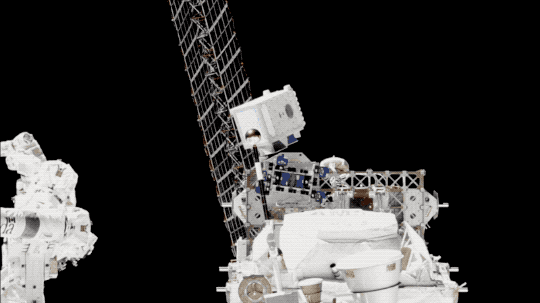
But how can we use these X-ray pulses as navigational tools? Enter SEXTANT, or Station Explorer for X-ray Timing and Navigation Technology. If NICER was your phone, SEXTANT would be like an app on it.
During the first few years of NICER’s observations, SEXTANT created an on-board navigation system using NICER’s pulsar data. It worked by measuring the consistent timing between each pulsar’s pulses to map a set of cosmic beacons.
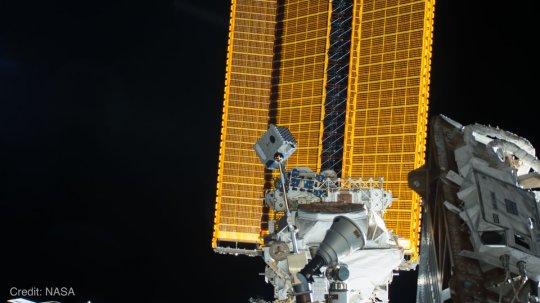
When calculating position or location, extremely accurate timekeeping is essential. We usually rely on atomic clocks, which use the predictable fluctuations of atoms to tick away the seconds. These atomic clocks can be located on the ground or in space, like the ones on GPS satellites. However, our GPS system only works on or close to Earth, and onboard atomic clocks can be expensive and heavy. Using pulsar observations instead could give us free and reliable “clocks” for navigation. During its experiment, SEXTANT was able to successfully determine the space station’s orbital position!
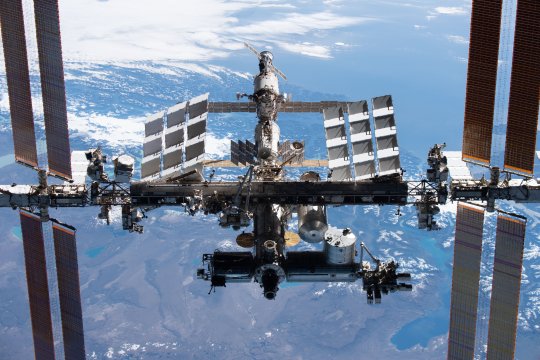
We can calculate distances using the time taken for a signal to travel between two objects to determine a spacecraft’s approximate location relative to those objects. However, we would need to observe more pulsars to pinpoint a more exact location of a spacecraft. As SEXTANT gathered signals from multiple pulsars, it could more accurately derive its position in space.
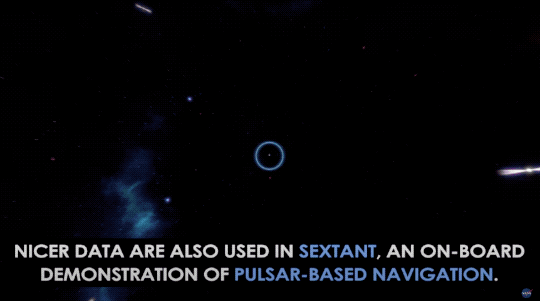
So, imagine you are an astronaut on a lengthy journey to the outer solar system. You could use the technology developed by SEXTANT to help plot your course. Since pulsars are reliable and consistent in their spins, you wouldn’t need Wi-Fi or cell service to figure out where you were in relation to your destination. The pulsar-based navigation data could even help you figure out your ETA!

None of these missions or experiments would be possible without Jocelyn Bell Burnell’s keen eye for an odd spot in her radio data decades ago, which set the stage for the idea to use spinning neutron stars as a celestial GPS. Her contribution to the field of astrophysics laid the groundwork for research benefitting the people of the future, who yearn to sail amongst the stars.
Keep up with the latest NICER news by following NASA Universe on X and Facebook and check out the mission’s website. For more on space navigation, follow @NASASCaN on X or visit NASA’s Space Communications and Navigation website.
Make sure to follow us on Tumblr for your regular dose of space!
#NASA#pulsar#Jocelyn Bell Burnell#spaceblr#space#star#neutron star#deep space#telescope#navigation#universe#astronomy#science
4K notes
·
View notes
Text
Autoenshittification
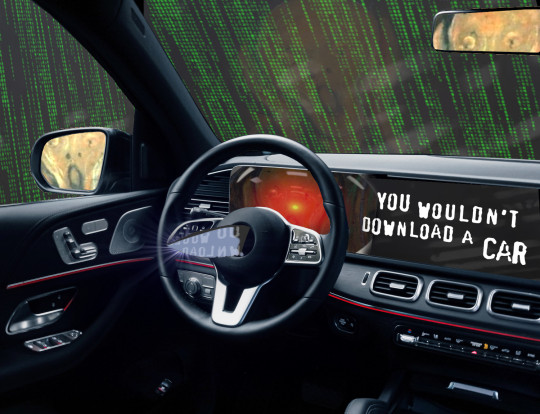
Forget F1: the only car race that matters now is the race to turn your car into a digital extraction machine, a high-speed inkjet printer on wheels, stealing your private data as it picks your pocket. Your car’s digital infrastructure is a costly, dangerous nightmare — but for automakers in pursuit of postcapitalist utopia, it’s a dream they can’t give up on.
Your car is stuffed full of microchips, a fact the world came to appreciate after the pandemic struck and auto production ground to a halt due to chip shortages. Of course, that wasn’t the whole story: when the pandemic started, the automakers panicked and canceled their chip orders, only to immediately regret that decision and place new orders.
But it was too late: semiconductor production had taken a serious body-blow, and when Big Car placed its new chip orders, it went to the back of a long, slow-moving line. It was a catastrophic bungle: microchips are so integral to car production that a car is basically a computer network on wheels that you stick your fragile human body into and pray.
The car manufacturers got so desperate for chips that they started buying up washing machines for the microchips in them, extracting the chips and discarding the washing machines like some absurdo-dystopian cyberpunk walnut-shelling machine:
https://www.autoevolution.com/news/desperate-times-companies-buy-washing-machines-just-to-rip-out-the-chips-187033.html
These digital systems are a huge problem for the car companies. They are the underlying cause of a precipitous decline in car quality. From touch-based digital door-locks to networked sensors and cameras, every digital system in your car is a source of endless repair nightmares, costly recalls and cybersecurity vulnerabilities:
https://www.reuters.com/business/autos-transportation/quality-new-vehicles-us-declining-more-tech-use-study-shows-2023-06-22/
What’s more, drivers hate all the digital bullshit, from the janky touchscreens to the shitty, wildly insecure apps. Digital systems are drivers’ most significant point of dissatisfaction with the automakers’ products:
https://www.theverge.com/23801545/car-infotainment-customer-satisifaction-survey-jd-power
Even the automakers sorta-kinda admit that this is a problem. Back in 2020 when Massachusetts was having a Right-to-Repair ballot initiative, Big Car ran these unfuckingbelievable scare ads that basically said, “Your car spies on you so comprehensively that giving anyone else access to its systems will let murderers stalk you to your home and kill you:
https://pluralistic.net/2020/09/03/rip-david-graeber/#rolling-surveillance-platforms
But even amid all the complaining about cars getting stuck in the Internet of Shit, there’s still not much discussion of why the car-makers are making their products less attractive, less reliable, less safe, and less resilient by stuffing them full of microchips. Are car execs just the latest generation of rubes who’ve been suckered by Silicon Valley bullshit and convinced that apps are a magic path to profitability?
Nope. Car execs are sophisticated businesspeople, and they’re surfing capitalism’s latest — and last — hot trend: dismantling capitalism itself.
Now, leftists have been predicting the death of capitalism since The Communist Manifesto, but even Marx and Engels warned us not to get too frisky: capitalism, they wrote, is endlessly creative, constantly reinventing itself, re-emerging from each crisis in a new form that is perfectly adapted to the post-crisis reality:
https://www.nytimes.com/2022/10/31/books/review/a-spectre-haunting-china-mieville.html
But capitalism has finally run out of gas. In his forthcoming book, Techno Feudalism: What Killed Capitalism, Yanis Varoufakis proposes that capitalism has died — but it wasn’t replaced by socialism. Rather, capitalism has given way to feudalism:
https://www.penguin.co.uk/books/451795/technofeudalism-by-varoufakis-yanis/9781847927279
Under capitalism, capital is the prime mover. The people who own and mobilize capital — the capitalists — organize the economy and take the lion’s share of its returns. But it wasn’t always this way: for hundreds of years, European civilization was dominated by rents, not markets.
A “rent” is income that you get from owning something that other people need to produce value. Think of renting out a house you own: not only do you get paid when someone pays you to live there, you also get the benefit of rising property values, which are the result of the work that all the other homeowners, business owners, and residents do to make the neighborhood more valuable.
The first capitalists hated rent. They wanted to replace the “passive income” that landowners got from taxing their serfs’ harvest with active income from enclosing those lands and grazing sheep in order to get wool to feed to the new textile mills. They wanted active income — and lots of it.
Capitalist philosophers railed against rent. The “free market” of Adam Smith wasn’t a market that was free from regulation — it was a market free from rents. The reason Smith railed against monopolists is because he (correctly) understood that once a monopoly emerged, it would become a chokepoint through which a rentier could cream off the profits he considered the capitalist’s due:
https://locusmag.com/2021/03/cory-doctorow-free-markets/
Today, we live in a rentier’s paradise. People don’t aspire to create value — they aspire to capture it. In Survival of the Richest, Doug Rushkoff calls this “going meta”: don’t provide a service, just figure out a way to interpose yourself between the provider and the customer:
https://pluralistic.net/2022/09/13/collapse-porn/#collapse-porn
Don’t drive a cab, create Uber and extract value from every driver and rider. Better still: don’t found Uber, invest in Uber options and extract value from the people who invest in Uber. Even better, invest in derivatives of Uber options and extract value from people extracting value from people investing in Uber, who extract value from drivers and riders. Go meta.
This is your brain on the four-hour-work-week, passive income mind-virus. In Techno Feudalism, Varoufakis deftly describes how the new “Cloud Capital” has created a new generation of rentiers, and how they have become the richest, most powerful people in human history.
Shopping at Amazon is like visiting a bustling city center full of stores — but each of those stores’ owners has to pay the majority of every sale to a feudal landlord, Emperor Jeff Bezos, who also decides which goods they can sell and where they must appear on the shelves. Amazon is full of capitalists, but it is not a capitalist enterprise. It’s a feudal one:
https://pluralistic.net/2022/11/28/enshittification/#relentless-payola
This is the reason that automakers are willing to enshittify their products so comprehensively: they were one of the first industries to decouple rents from profits. Recall that the reason that Big Car needed billions in bailouts in 2008 is that they’d reinvented themselves as loan-sharks who incidentally made cars, lending money to car-buyers and then “securitizing” the loans so they could be traded in the capital markets.
Even though this strategy brought the car companies to the brink of ruin, it paid off in the long run. The car makers got billions in public money, paid their execs massive bonuses, gave billions to shareholders in buybacks and dividends, smashed their unions, fucked their pensioned workers, and shipped jobs anywhere they could pollute and murder their workforce with impunity.
Car companies are on the forefront of postcapitalism, and they understand that digital is the key to rent-extraction. Remember when BMW announced that it was going to rent you the seatwarmer in your own fucking car?
https://pluralistic.net/2020/07/02/big-river/#beemers
Not to be outdone, Mercedes announced that they were going to rent you your car’s accelerator pedal, charging an extra $1200/year to unlock a fully functional acceleration curve:
https://www.theverge.com/2022/11/23/23474969/mercedes-car-subscription-faster-acceleration-feature-price
This is the urinary tract infection business model: without digitization, all your car’s value flowed in a healthy stream. But once the car-makers add semiconductors, each one of those features comes out in a painful, burning dribble, with every button on that fakakta touchscreen wired directly into your credit-card.
But it’s just for starters. Computers are malleable. The only computer we know how to make is the Turing Complete Von Neumann Machine, which can run every program we know how to write. Once they add networked computers to your car, the Car Lords can endlessly twiddle the knobs on the back end, finding new ways to extract value from you:
https://doctorow.medium.com/twiddler-1b5c9690cce6
That means that your car can track your every movement, and sell your location data to anyone and everyone, from marketers to bounty-hunters looking to collect fees for tracking down people who travel out of state for abortions to cops to foreign spies:
https://www.vice.com/en/article/n7enex/tool-shows-if-car-selling-data-privacy4cars-vehicle-privacy-report
Digitization supercharges financialization. It lets car-makers offer subprime auto-loans to desperate, poor people and then killswitch their cars if they miss a payment:
https://www.youtube.com/watch?v=4U2eDJnwz_s
Subprime lending for cars would be a terrible business without computers, but digitization makes it a great source of feudal rents. Car dealers can originate loans to people with teaser rates that quickly blow up into payments the dealer knows their customer can’t afford. Then they repo the car and sell it to another desperate person, and another, and another:
https://pluralistic.net/2022/07/27/boricua/#looking-for-the-joke-with-a-microscope
Digitization also opens up more exotic options. Some subprime cars have secondary control systems wired into their entertainment system: miss a payment and your car radio flips to full volume and bellows an unstoppable, unmutable stream of threats. Tesla does one better: your car will lock and immobilize itself, then blare its horn and back out of its parking spot when the repo man arrives:
https://tiremeetsroad.com/2021/03/18/tesla-allegedly-remotely-unlocks-model-3-owners-car-uses-smart-summon-to-help-repo-agent/
Digital feudalism hasn’t stopped innovating — it’s just stopped innovating good things. The digital device is an endless source of sadistic novelties, like the cellphones that disable your most-used app the first day you’re late on a payment, then work their way down the other apps you rely on for every day you’re late:
https://restofworld.org/2021/loans-that-hijack-your-phone-are-coming-to-india/
Usurers have always relied on this kind of imaginative intimidation. The loan-shark’s arm-breaker knows you’re never going to get off the hook; his goal is in intimidating you into paying his boss first, liquidating your house and your kid’s college fund and your wedding ring before you default and he throws you off a building.
Thanks to the malleability of computerized systems, digital arm-breakers have an endless array of options they can deploy to motivate you into paying them first, no matter what it costs you:
https://pluralistic.net/2021/04/02/innovation-unlocks-markets/#digital-arm-breakers
Car-makers are trailblazers in imaginative rent-extraction. Take VIN-locking: this is the practice of adding cheap microchips to engine components that communicate with the car’s overall network. After a new part is installed in your car, your car’s computer does a complex cryptographic handshake with the part that requires an unlock code provided by an authorized technician. If the code isn’t entered, the car refuses to use that part.
VIN-locking has exploded in popularity. It’s in your iPhone, preventing you from using refurb or third-party replacement parts:
https://doctorow.medium.com/apples-cement-overshoes-329856288d13
It’s in fuckin’ ventilators, which was a nightmare during lockdown as hospital techs nursed their precious ventilators along by swapping parts from dead systems into serviceable ones:
https://www.vice.com/en/article/3azv9b/why-repair-techs-are-hacking-ventilators-with-diy-dongles-from-poland
And of course, it’s in tractors, along with other forms of remote killswitch. Remember that feelgood story about John Deere bricking the looted Ukrainian tractors whose snitch-chips showed they’d been relocated to Russia?
https://doctorow.medium.com/about-those-kill-switched-ukrainian-tractors-bc93f471b9c8
That wasn’t a happy story — it was a cautionary tale. After all, John Deere now controls the majority of the world’s agricultural future, and they’ve boobytrapped those ubiquitous tractors with killswitches that can be activated by anyone who hacks, takes over, or suborns Deere or its dealerships.
Control over repair isn’t limited to gouging customers on parts and service. When a company gets to decide whether your device can be fixed, it can fuck you over in all kinds of ways. Back in 2019, Tim Apple told his shareholders to expect lower revenues because people were opting to fix their phones rather than replace them:
https://www.apple.com/newsroom/2019/01/letter-from-tim-cook-to-apple-investors/
By usurping your right to decide who fixes your phone, Apple gets to decide whether you can fix it, or whether you must replace it. Problem solved — and not just for Apple, but for car makers, tractor makers, ventilator makers and more. Apple leads on this, even ahead of Big Car, pioneering a “recycling” program that sees trade-in phones shredded so they can’t possibly be diverted from an e-waste dump and mined for parts:
https://www.vice.com/en/article/yp73jw/apple-recycling-iphones-macbooks
John Deere isn’t sleeping on this. They’ve come up with a valuable treasure they extract when they win the Right-to-Repair: Deere singles out farmers who complain about its policies and refuses to repair their tractors, stranding them with six-figure, two-ton paperweight:
https://pluralistic.net/2022/05/31/dealers-choice/#be-a-shame-if-something-were-to-happen-to-it
The repair wars are just a skirmish in a vast, invisible fight that’s been waged for decades: the War On General-Purpose Computing, where tech companies use the law to make it illegal for you to reconfigure your devices so they serve you, rather than their shareholders:
https://memex.craphound.com/2012/01/10/lockdown-the-coming-war-on-general-purpose-computing/
The force behind this army is vast and grows larger every day. General purpose computers are antithetical to technofeudalism — all the rents extracted by technofeudalists would go away if others (tinkereres, co-ops, even capitalists!) were allowed to reconfigure our devices so they serve us.
You’ve probably noticed the skirmishes with inkjet printer makers, who can only force you to buy their ink at 20,000% markups if they can stop you from deciding how your printer is configured:
https://pluralistic.net/2022/08/07/inky-wretches/#epson-salty
But we’re also fighting against insulin pump makers, who want to turn people with diabetes into walking inkjet printers:
https://pluralistic.net/2022/06/10/loopers/#hp-ification
And companies that make powered wheelchairs:
https://pluralistic.net/2022/06/08/chair-ish/#r2r
These companies start with people who have the least agency and social power and wreck their lives, then work their way up the privilege gradient, coming for everyone else. It’s called the “shitty technology adoption curve”:
https://pluralistic.net/2022/08/21/great-taylors-ghost/#solidarity-or-bust
Technofeudalism is the public-private-partnership from hell, emerging from a combination of state and private action. On the one hand, bailing out bankers and big business (rather than workers) after the 2008 crash and the covid lockdown decoupled income from profits. Companies spent billions more than they earned were still wildly profitable, thanks to those public funds.
But there’s also a policy dimension here. Some of those rentiers’ billions were mobilized to both deconstruct antitrust law (allowing bigger and bigger companies and cartels) and to expand “IP” law, turning “IP” into a toolsuite for controlling the conduct of a firm’s competitors, critics and customers:
https://locusmag.com/2020/09/cory-doctorow-ip/
IP is key to understanding the rise of technofeudalism. The same malleability that allows companies to “twiddle” the knobs on their services and keep us on the hook as they reel us in would hypothetically allow us to countertwiddle, seizing the means of computation:
https://pluralistic.net/2023/04/12/algorithmic-wage-discrimination/#fishers-of-men
The thing that stands between you and an alternative app store, an interoperable social media network that you can escape to while continuing to message the friends you left behind, or a car that anyone can fix or unlock features for is IP, not technology. Under capitalism, that technology would already exist, because capitalists have no loyalty to one another and view each other’s margins as their own opportunities.
But under technofeudalism, control comes from rents (owning things), not profits (selling things). The capitalist who wants to participate in your iPhone’s “ecosystem” has to make apps and submit them to Apple, along with 30% of their lifetime revenues — they don’t get to sell you jailbreaking kit that lets you choose their app store.
Rent-seeking technology has a holy grail: control over “ring zero” — the ability to compel you to configure your computer to a feudalist’s specifications, and to verify that you haven’t altered your computer after it came into your possession:
https://pluralistic.net/2022/01/30/ring-minus-one/#drm-political-economy
For more than two decades, various would-be feudal lords and their court sorcerers have been pitching ways of doing this, of varying degrees of outlandishness.
At core, here’s what they envision: inside your computer, they will nest another computer, one that is designed to run a very simple set of programs, none of which can be altered once it leaves the factory. This computer — either a whole separate chip called a “Trusted Platform Module” or a region of your main processor called a secure enclave — can tally observations about your computer: which operating system, modules and programs it’s running.
Then it can cryptographically “sign” these observations, proving that they were made by a secure chip and not by something you could have modified. Then you can send this signed “attestation” to someone else, who can use it to determine how your computer is configured and thus whether to trust it. This is called “remote attestation.”
There are some cool things you can do with remote attestation: for example, two strangers playing a networked video game together can use attestations to make sure neither is running any cheat modules. Or you could require your cloud computing provider to use attestations that they aren’t stealing your data from the server you’re renting. Or if you suspect that your computer has been infected with malware, you can connect to someone else and send them an attestation that they can use to figure out whether you should trust it.
Today, there’s a cool remote attestation technology called “PrivacyPass” that replaces CAPTCHAs by having you prove to your own device that you are a human. When a server wants to make sure you’re a person, it sends a random number to your device, which signs that number along with its promise that it is acting on behalf of a human being, and sends it back. CAPTCHAs are all kinds of bad — bad for accessibility and privacy — and this is really great.
But the billions that have been thrown at remote attestation over the decades is only incidentally about solving CAPTCHAs or verifying your cloud server. The holy grail here is being able to make sure that you’re not running an ad-blocker. It’s being able to remotely verify that you haven’t disabled the bossware your employer requires. It’s the power to block someone from opening an Office365 doc with LibreOffice. It’s your boss’s ability to ensure that you haven’t modified your messaging client to disable disappearing messages before he sends you an auto-destructing memo ordering you to break the law.
And there’s a new remote attestation technology making the rounds: Google’s Web Environment Integrity, which will leverage Google’s dominance over browsers to allow websites to block users who run ad-blockers:
https://github.com/RupertBenWiser/Web-Environment-Integrity
There’s plenty else WEI can do (it would make detecting ad-fraud much easier), but for every legitimate use, there are a hundred ways this could be abused. It’s a technology purpose-built to allow rent extraction by stripping us of our right to technological self-determination.
Releasing a technology like this into a world where companies are willing to make their products less reliable, less attractive, less safe and less resilient in pursuit of rents is incredibly reckless and shortsighted. You want unauthorized bread? This is how you get Unauthorized Bread:
https://arstechnica.com/gaming/2020/01/unauthorized-bread-a-near-future-tale-of-refugees-and-sinister-iot-appliances/amp/

If you'd like an essay-formatted version of this thread to read or share, here's a link to it on pluralistic.net, my surveillance-free, ad-free, tracker-free blog:
https://pluralistic.net/2023/07/24/rent-to-pwn/#kitt-is-a-demon

[Image ID: The interior of a luxury car. There is a dagger protruding from the steering wheel. The entertainment console has been replaced by the text 'You wouldn't download a car,' in MPAA scare-ad font. Outside of the windscreen looms the Matrix waterfall effect. Visible in the rear- and side-view mirror is the driver: the figure from Munch's 'Scream.' The screen behind the steering-wheel has been replaced by the menacing red eye of HAL9000 from Stanley Kubrick's '2001: A Space Odyssey.']

Image:
Cryteria (modified)
https://commons.wikimedia.org/wiki/File:HAL9000.svg
CC BY 3.0
https://creativecommons.org/licenses/by/3.0/deed.en
#pluralistic#shitty technology adoption curve#unauthorized bread#automotive#arm-breakers#cars#big car#right to repair#rent-seeking#digital feudalism#neofeudalism#drm#wei#remote attestation#private access tokens#yannis varoufakis#web environment integrity#paternalism#war on general purpose computing#competitive compatibility#google#enshittification#interoperability#adversarial interoperability#comcom#the internet con#postcapitalism#ring zero#care#med-tech
4K notes
·
View notes